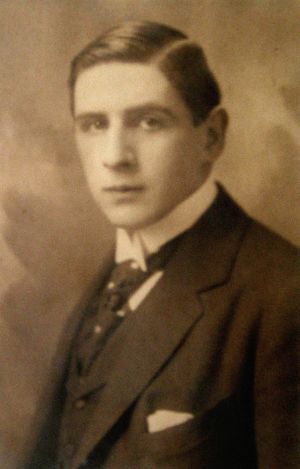Hermann Broch facts for kids
Quick facts for kids
Hermann Broch
|
|
|---|---|
 |
|
| Born | November 1, 1886 Vienna, Austria-Hungary |
| Died | May 30, 1951 (aged 64) New Haven, Connecticut |
| Nationality | Austrian |
| Literary movement | Modernism |
Hermann Broch (born November 1, 1886 – died May 30, 1951) was an important Austrian writer. He is famous for two major books. These books are The Sleepwalkers (1930–32) and The Death of Virgil (1945). His writing style is part of a movement called Modernism.
Life Story of Hermann Broch
Hermann Broch was born in Vienna, which was then part of Austria-Hungary. His family was wealthy and Jewish. He worked for a while in his family's factory. Even then, he loved literature in his free time. As the oldest son, he was expected to take over the textile factory. So, he studied textile manufacturing at college.
In 1909, he became a Catholic. He married Franziska von Rothermann. Their son, Hermann Friedrich Maria, was born the next year. His marriage ended in divorce in 1923. In 1927, he sold the factory. He decided to study mathematics, philosophy, and psychology at the University of Vienna.
Broch started writing full-time when he was about 40 years old. His first big work, The Sleepwalkers, was published when he was 45. It came out in three parts between 1930 and 1932.
After Nazis took over Austria in 1938, Broch was arrested. This happened in a small town called Bad Aussee. He was held in jail for a few weeks. Friends like James Joyce and Thornton Wilder helped him. They helped him leave Austria. He first went to Britain and then to the United States.
In the United States, he published The Death of Virgil. He also published a collection of short stories called The Guiltless. While living away from his home country, he wrote about politics. He also studied how large groups of people behave. He wanted to defend democracy and human rights.
Hermann Broch lived in the house of Albert Einstein for a month in 1939. This was in Princeton, New Jersey. From 1942 to 1948, he lived in an apartment in Princeton. Broch died in 1951 in New Haven, Connecticut. He is buried in Killingworth, Connecticut. He was nominated for the Nobel Prize in Literature in 1950.
Hermann Broch's Works
Broch's first major work was the three-part novel The Sleepwalkers. It was published from 1930 to 1932. In this series, Broch explored the idea of "values falling apart." The famous writer Milan Kundera has praised this trilogy. Kundera's own writing was greatly influenced by Broch.
One of his most important books is The Death of Virgil. It was first published in 1945. Broch started writing it as a short radio talk in 1937. He worked on it for eight years. During this time, he was jailed in Austria. He then escaped to Scotland and later to the United States.
This long and complex novel mixes reality, dreams, poetry, and regular writing. It tells the story of the last 18 hours of the Roman poet Virgil's life. Virgil is in the port of Brundisium. He is upset by the problems in the society he wrote about in his epic poem, Aeneid. Virgil wants to burn his poem. But his friend, Emperor Augustus, stops him. Virgil then dies from his illness. The last part of the book describes Virgil's final dreams.
Broch's last book published before he died was The Guiltless (1950). This was a collection of short stories. Broch was very skilled at using different writing styles. He could write gentle parodies. He also wrote deep essays and imaginative, poetic stories.
See also
 In Spanish: Hermann Broch para niños
In Spanish: Hermann Broch para niños
- Exilliteratur
 | Sharif Bey |
 | Hale Woodruff |
 | Richmond Barthé |
 | Purvis Young |

